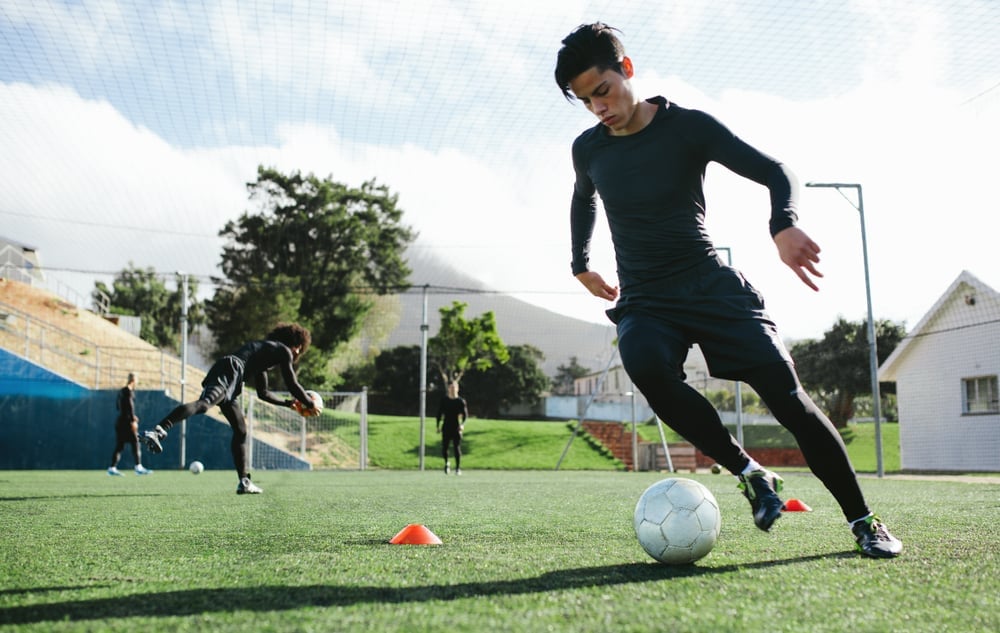To become a successful soccer player, it is crucial to practice and master specific skills. These skills lay the foundation for growth and improvement in the game. In this article, we will explore the nine essential soccer skills that every player should focus on, especially during the early stages of learning the game. By developing these skills, players can gain confidence and unlock their full potential.
1. Full Match Fitness
One cannot underestimate the importance of stamina and fitness in soccer. It is a fundamental skill that players need to prioritize. Being in top shape allows players to perform well throughout a match, even under pressure. To achieve match fitness, players should engage in regular running exercises during the offseason. This includes both long-distance and speed training sessions. Running drills and other lightweight exercises can greatly contribute to overall fitness levels.
2. General Ball Control
Ball control is a fundamental skill that players must master. It involves receiving passes, shielding the ball from defenders, and maneuvering it effectively. Dribbling exercises are essential for improving ball control. Players should start at a slow pace and gradually increase their speed. It is equally important to practice ball control using different body parts, such as the chest, thighs, and head. These drills can be done alone or with a partner, using a wall or rebounding net for passing exercises.
3. Passing
Passing is a vital skill in soccer, as it promotes teamwork and creates scoring opportunities. Players should begin with basic passes, gradually increasing the difficulty and speed. They should learn to determine the right amount of power required for accurate passes. As players progress, they can practice making crisp passes at a faster pace and under the pressure of defenders. Mastering accurate passing opens up numerous possibilities for individual and team success.
4. Dribbling While Running
Dribbling while running is a fundamental skill in soccer. It involves controlling the ball while moving at high speeds. Players should strive to reach their maximum speed while maintaining control of the ball. Dribbling drills can be practiced alone or with a partner. The ability to dribble with different parts of the foot enhances versatility and control. Developing this skill helps players navigate through tight spaces and gain an advantage over opponents.
5. Cutting With The Ball
Effective cutting with the ball is a valuable skill that players should learn. It involves changing direction quickly to confuse opponents. Purposeful cuts can create opportunities to advance the ball or create space for a shot or pass. Players should practice cutting with the ball, focusing on controlled movements that catch defenders off-guard. Incorporating different types of cuts into their repertoire will make players more unpredictable and effective on the field.
6. Turning With The Ball
To change direction effectively, players must master the skill of turning. Turning requires coordination and quick footwork. Players should practice various turning techniques to stay one step ahead of defenders. Learning to turn accurately and confidently will open up new possibilities both offensively and defensively. It is recommended to practice cutting before advancing to more complex turning drills.
7. Shooting
Xem thêm : Scottish Football Stadiums
Shooting is one of the most enjoyable skills to practice in soccer. Players should focus on shooting from different angles and distances, including shots off the dribble and first touches. Understanding how the ball reacts when struck at different speeds and parts of the ball is crucial. Developing accuracy and confidence with both feet is essential for scoring goals. Practice with the non-dominant foot to increase versatility and keep opponents guessing.
8. First Touch Confidence
Mastering the technique of a confident first touch is essential in soccer. Controlling the ball without letting it bounce away requires proper technique. Players must lock their ankles and hit the ball with the center of their foot to provide cushioning and maintain control. As players become more confident in their basic first touch, they can learn advanced moves for different game situations. Developing a repertoire of first touch skills enables players to excel in various scenarios.
9. Attitude
Attitude plays a significant role in soccer. Although it may not be considered a technical skill, a positive mindset and mental resilience are essential. Determination and a strong work ethic are crucial for success in the sport. Soccer players face challenges and setbacks, but maintaining the right attitude helps them overcome adversity. Hard work and dedication are skills that every player should possess to continue progressing in their soccer journey.
FAQs
Q: How can I improve my soccer skills?
A: Improving soccer skills requires consistent practice and dedication. Focus on mastering the essential skills mentioned in this article, such as ball control, passing, dribbling, shooting, and fitness. Regular training sessions, both individual and with a team, are essential for improvement.
Q: Can I become a professional soccer player by practicing these skills?
A: While mastering these skills is crucial for becoming a successful soccer player, other factors, such as teamwork, tactical understanding, and mindset, also play significant roles. Continuous improvement, proper coaching, and opportunities to showcase your talent are important to pursue a professional career in soccer.
Q: Are these skills suitable for players of all ages?
A: Yes, these skills can be practiced and mastered by players of all ages. However, the training intensity and progression may vary based on the player’s age and experience. Younger players should focus on building a strong foundation in basic skills before advancing to more complex techniques.
Conclusion
Mastering the nine essential soccer skills outlined in this article is vital for players looking to excel in the game. By practicing and improving in these areas, players can enhance their overall performance and reach their maximum potential. Whether you are a beginner or an experienced player, continuous development and a positive attitude are key to success. So lace up your boots, grab a ball, and start honing your soccer skills today!
Nguồn: https://movin993.com
Danh mục: Tin tức












